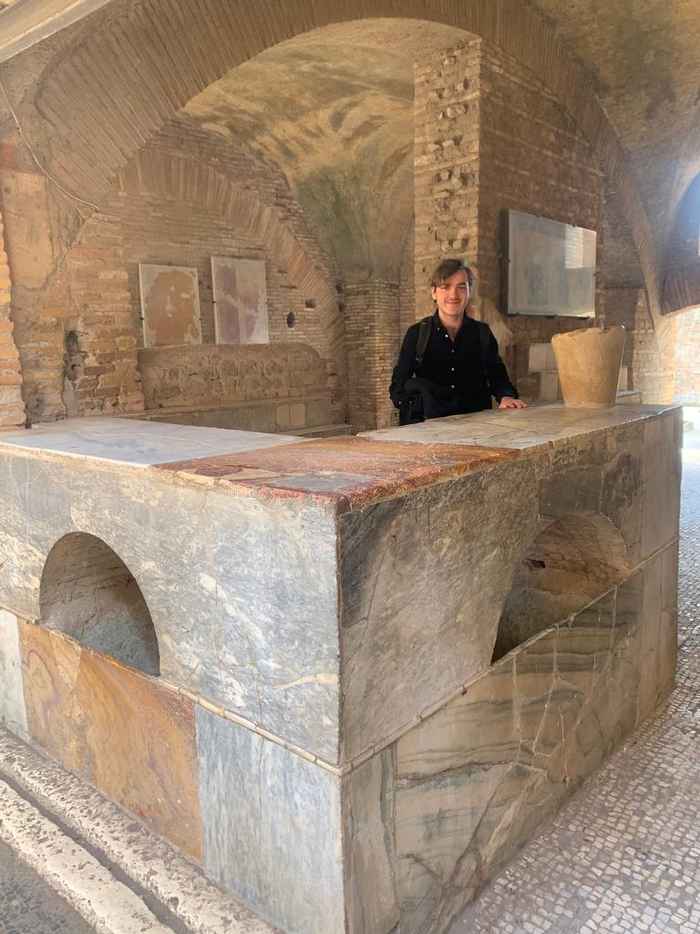'For me, antiquity is where history remains reality, but at the same time you can let your imagination run wild'

How did you come to ACASA?
‘While I was taking my minor for my Bachelor’s in History, I studied in Bologna for a while. There, my Messiah Martijn Icks, who knows all the emperors in chronological order (from Augustus all the way to Romulus Augustulus, without bragging) invited me on an ACASA trip to Ravenna, the last capital of the Roman Empire. I fell in love with my fellow students, the history and Roman Ravenna, and wanted to stay at ACASA. That's how History turned into Antiquity.’
Why did you choose UvA?
‘For me, antiquity is where history remains reality, but at the same time you can let your imagination run wild. From the dark forests of Germania to the mythical cities of Mesopotamia, from the tiny taverns in gigantic Rome to the gigantic public assemblies of tiny poleis. UvA and VU bring these real-life fantasies together in the MA Classics & Ancient Civilizations, where you can hone your knowledge of Latin as well as the Latins. A specialisation within history, yet broad enough to encounter both Ramses II and Sappho, both Placidia and Homer.’
How do you feel about Amsterdam as a city to study this programme in?
‘Amsterdam is not only the Venice but also the Rome of the North. The centre of cultures, the place where it all happens. The Eternal City, La Grande Bellezza. For Antiquity students, Amsterdam has the beautiful Allard Pierson Museum; for culture lovers, an endless array of concert halls, art centres and theatre companies; and for any student, Amsterdam has the biggest amount of bikes and terraces per capita in the world.’
For me, antiquity is where history remains reality, but at the same time you can let your imagination run wild. From the dark forests of Germania to the mythical cities of Mesopotamia, from the tiny taverns in gigantic Rome to the gigantic public assemblies of tiny poleis. UvA and VU bring these real-life fantasies together in this Master's.
What do you like best about your study?
‘The atmosphere at the study is pleasant: enthusiastic students, even more enthusiastic teachers and a lot of nerds in the same place. I never knew that so many people find the exact same things interesting as I do and at the same time have their own extremely niche interests (for instance, personally, I am mainly a fan of the effects of the crossing of the Rhine by the Sueves, Vandals and Alans in 406 on the socio-cultural policies of the Roman emperors until around 435 or 440). So immerse yourself in all these niches. With a wide range of subjects, from Alexander's interracial marriages to Amenhotep's propaganda, this study offers plenty of options for immersion.’
How does your study fit in with modern times?
‘Mark Twain once said, “History never repeats itself, but it does often rhyme.” Once you immerse yourself in a Roman civil war, an Athenian speech, or the climate crisis of the third century, it becomes frighteningly clear that humanity manages to make the same mistakes again and again. Geert Wilders once gave a speech in Rome about how the integration of asylum seekers turned out to be the downfall of the Roman Empire. It is up to you to substantiate a confirmation or rejection of his argument. Let your knowledge of what once was speak to all that now is.’
What are your plans once you complete your studies?
My dream is to incorporate those weird Romans into my writing: research, reports, and novels. To delight magazines like Historia with a piece on the unfortunes of Alarik, and newspapers with a piece on the fortunes we can learn from Epicurus. This study taught me wonderful background knowledge as well as the ability to conduct thorough background research.